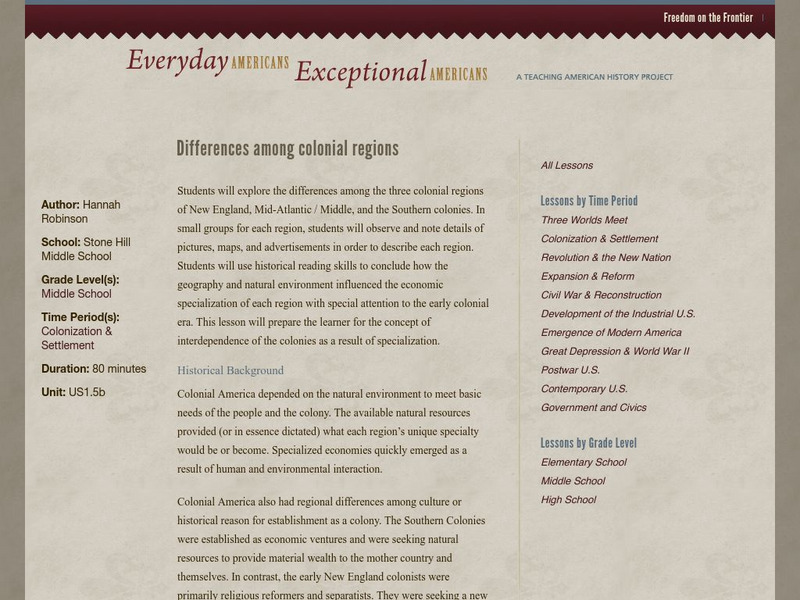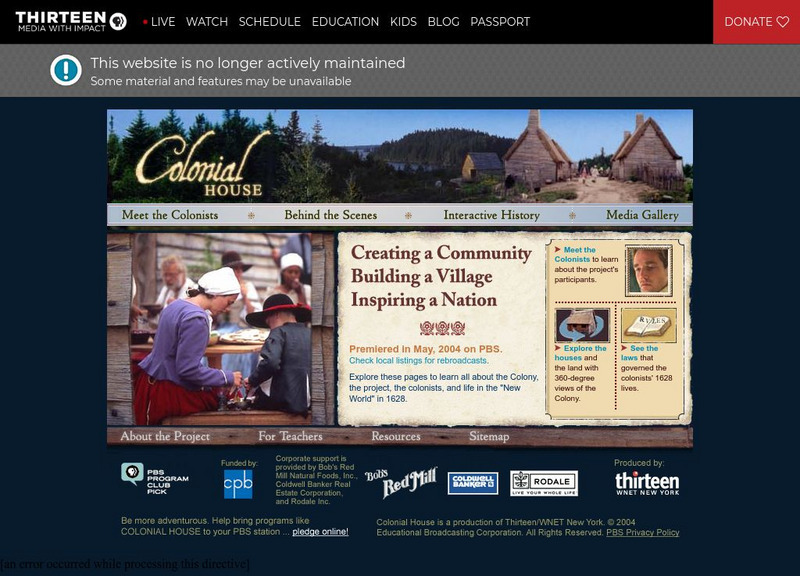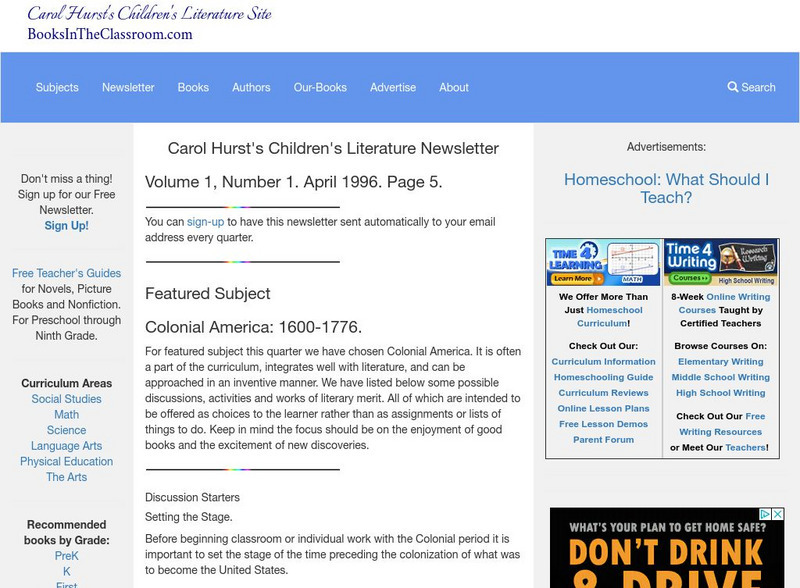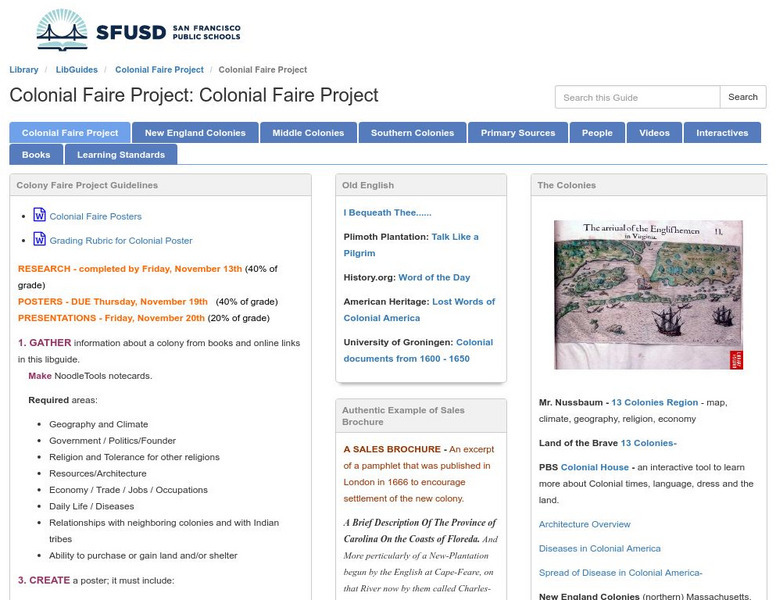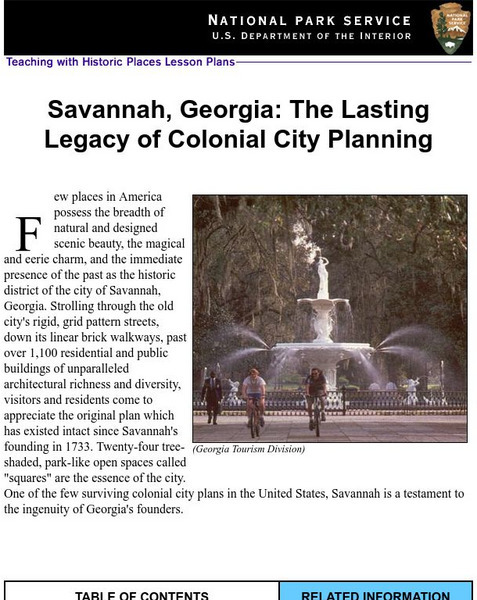Hi, what do you want to do?
Curated OER
Fort at No. 4 History
Students examine the history of Fort No. 4 in New Hampshire before visiting the site. They identify key events and people that occured at the fort as well. They complete questions and teach them to their group.
Curated OER
VS.3c
Students examine the settling of the Jamestown settlement and the importance of the Virginia Company of London. Students actively engage in various role-playing activities
Curated OER
South Carolina's Constitution
Eighth graders explore the definition of political culture. After viewing a movie, 8th graders discuss how the political culture of the 1600 and 1700s is reflected in early drafts of the South Carolina constitution.
Curated OER
Comparing Time Periods in U.S. History: The Ashford Project
Fifth graders use a "fact book" comparing periods in American history then students create a picture to illustrate their assigned periods. # # students use their pictures and concept maps to write expository paragraphs about their...
Curated OER
Declaration of Independence
Eighth graders explain the meaning of the Declaration of Independence. They view a political cartoon of the period, then do a writing assignment for homework. They write about how they would feel if the British were calling them traitors.
Curated OER
Last Year on Pluto
Students examine the astronomical concept of a year. They relate the passage of time on planets to historical events in the USA.
Curated OER
Quebec
Ninth graders to examine the past to find out why Quebec has been so determined to protect its cultural heritage. They access primary resources on the Internet to promote their engagement with the past.
Curated OER
A Revolutionary War Sea Battle
Students study the battle for the Serapis. In this measuring distance lesson, students find the North Sea on a globe and find various locations.
Curated OER
The British Empire – Where the Sun Never Set
Students read an article on the British Empire. In this ESL instructional activity, students explore the British Empire from the 1600's, then work in small groups to complete several activities that reinforce the information...
OpenStax
Open Stax: English Settlements in America
Read about the first English settlements in America, the differences between the Chesapeake Bay colonies and the New England colonies, the wars between native inhabitants and English colonists, and the role of Bacon's Rebellion in the...
George Mason University
Chnm: Differences Among Colonial Regions
Learners will explore the differences among the three colonial regions of New England, Mid-Atlantic/Middle, and the Southern colonies. In small groups for each region, students will observe and note details of pictures, maps, and...
Utah Education Network
Uen: Themepark: Liberty: United States Colonial History
Find a large collection of internet resources organized around colonial history. Links to places to go, people to see, things to do, teacher resources, and bibliographies.
Scholastic
Scholastic: Teaching With Dear America: Colonial Period
Activities useful in presenting American colonial life. Find references to novels, a colonial home, and a diary entry activity.
Colonial Williamsburg Foundation
Colonial Williamsburg: Colonial Religion
The site provides a detailed overview of role religion played in the lives of the colonists. Content explores how religion played a part in the Revolution, and the statute for religious freedom, as well as providing a lesson plan, a link...
PBS
Wnet: Thirteen: Colonial House
Companion website for Colonial House, a televised experiment in historical reenactment, provides information and insight about what daily life, in 1628, must have been like for English settlers in early America. With video clips from the...
Books in the Classroom
Carol Hurst's Children's Literature Site: Colonial America, 1600 1776
An extensive collection of ideas to use when planning a unit on Colonial America. The plan includes detailed lessons, a broad list of resources,and more.
Other
San Francisco Unified School District: Colonial Faire Project
A large collection of high-quality resources for learning and teaching about the Thirteen English Colonies. The main page outlines examples of student project possibilities. There are individual pages for primary resources, people from...
PBS
Wnet: Thirteen: Colonial House: For Teachers: 'Tis a Very Dirty Manner of Life
Interactive adjunct to the popular PBS series Colonial House, which follows the efforts of modern-day families attempting to live as early colonists in seventeenth-century Maine, focuses on the language and expressions common to that...
Curated OER
National Park Service: Savannah, Ga: Lasting Legacy of Colonial City Planning
The site explores the colonial history of the city of Savannah, Georgia. This interactive lesson has excellent information, an inquiry question, historical context, maps, readings, images, and activities.
Colonial Williamsburg Foundation
Colonial Williamsburg History
This page goes directly to the homepage of Colonial Williamsburg, which historically reenacts the life of early English settlement in Virginia.
Stanford University
Sheg: Document Based History: Reading Like a Historian:examining Passenger Lists
[Free Registration/Login Required] Students use primary source documents to investigate central historical questions. In this investigation, students critically examine the passenger lists of ships headed to New England and Virginia to...
Other
Plimouth Plantation: Thanksgiving Interactive: You Are the Historian
This site, developed by Plimoth Plantation, offers visitors the chance to use the skills of historians to peel away the layers of myth and misconception surrounding "The First Thanksgiving" and discover what might really have happened...
The History Place
The History Place: English Colonial Era 1700 to 1763
This site from The History Place provides a timeline of important events that occurred in the United States during the early- and mid-18th century. The information provided is in-depth and worth checking out.
iCivics
I Civics: Colonial Influences
Where did the American colonists get their ideas that lead to a revolution and a whole new kind of government? This lesson explores the Magna Carta, Mayflower Compact, English Bill of Rights, Cato's Letters, and Common Sense.















